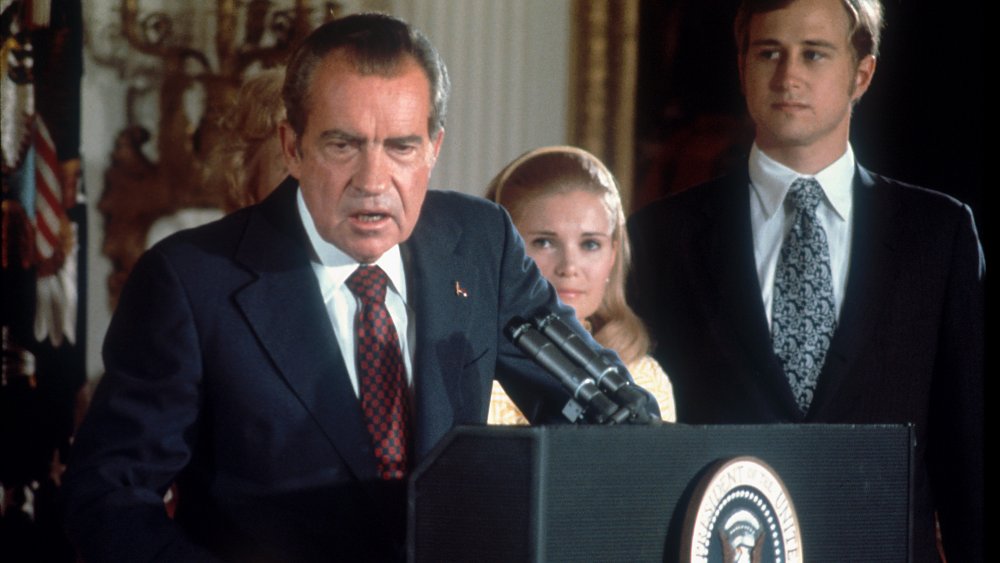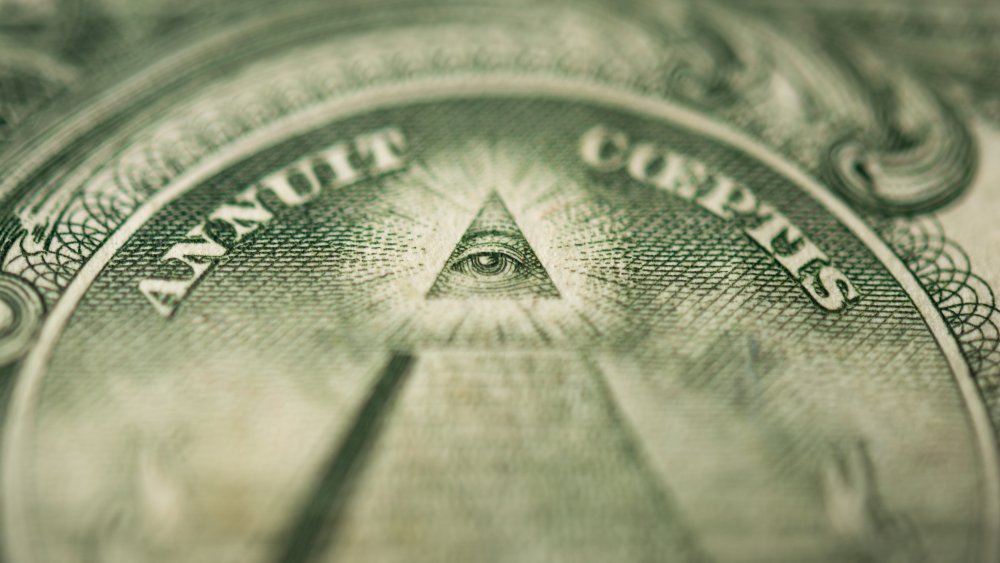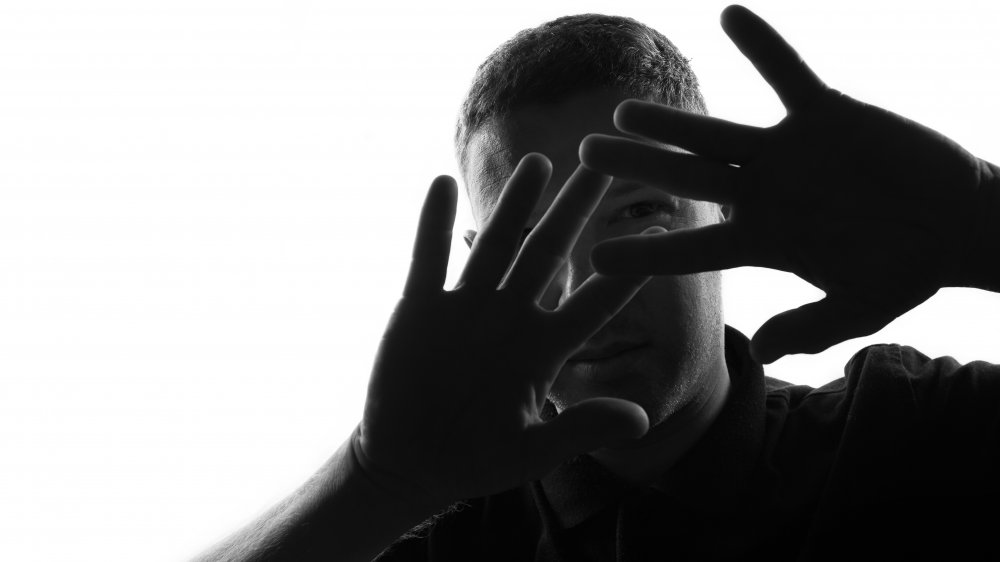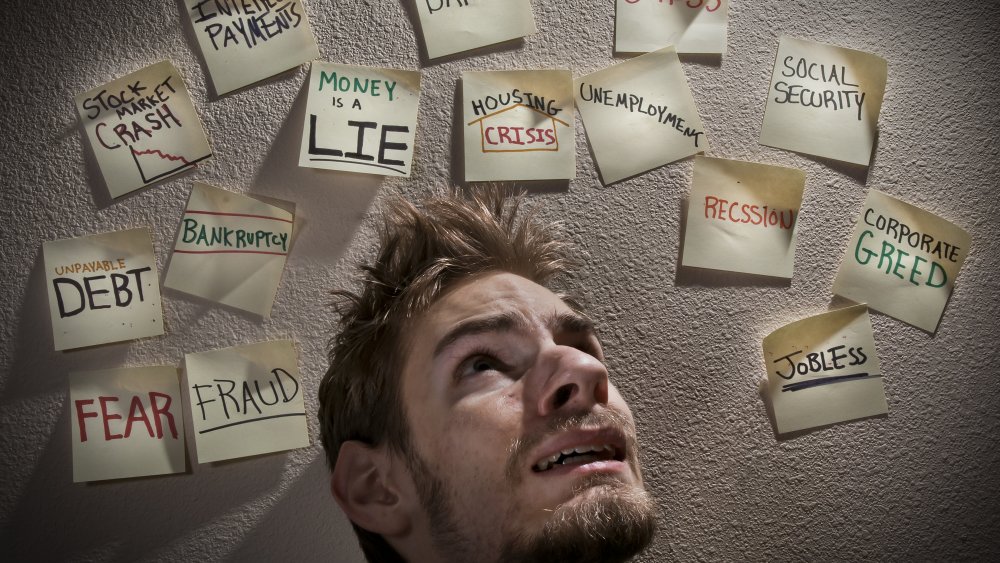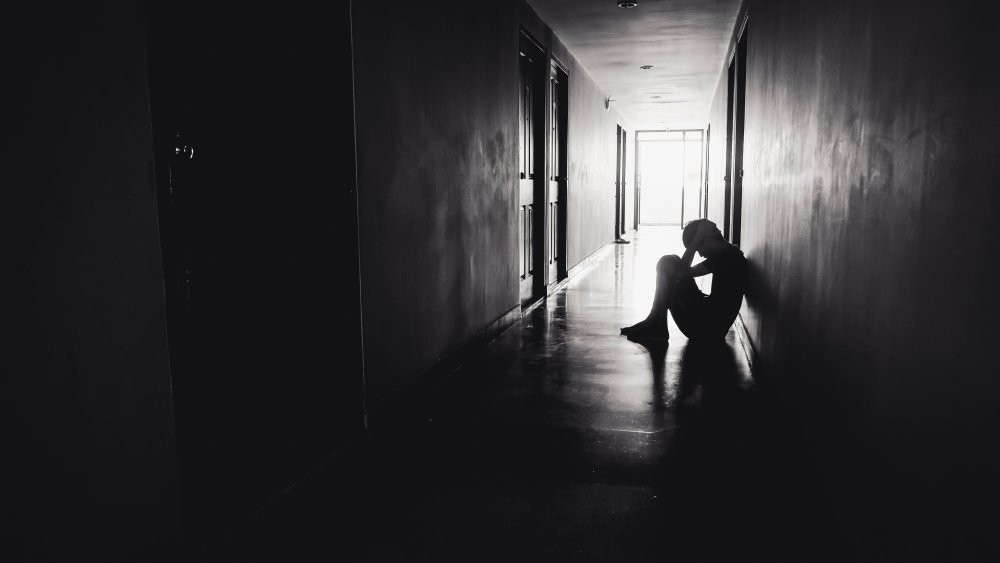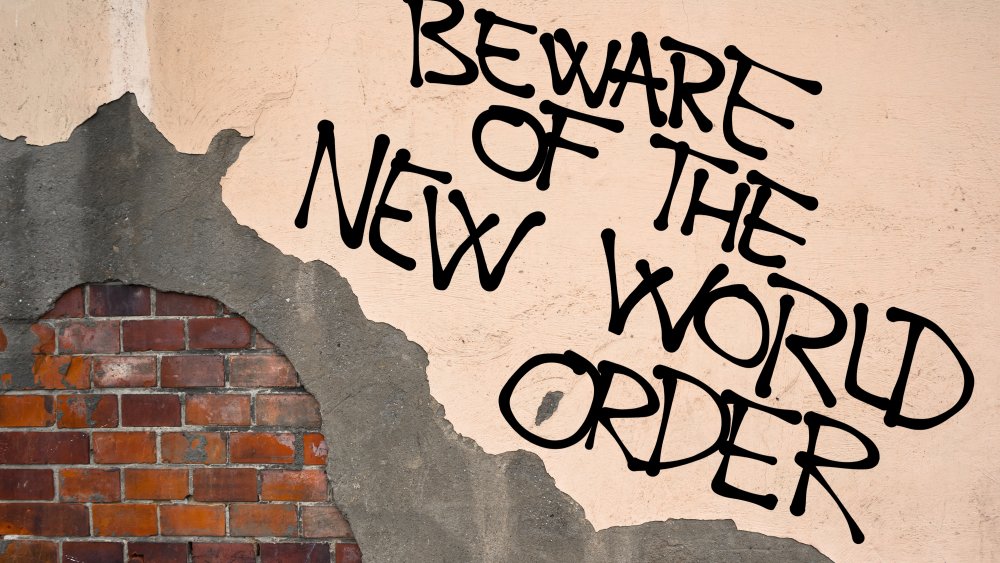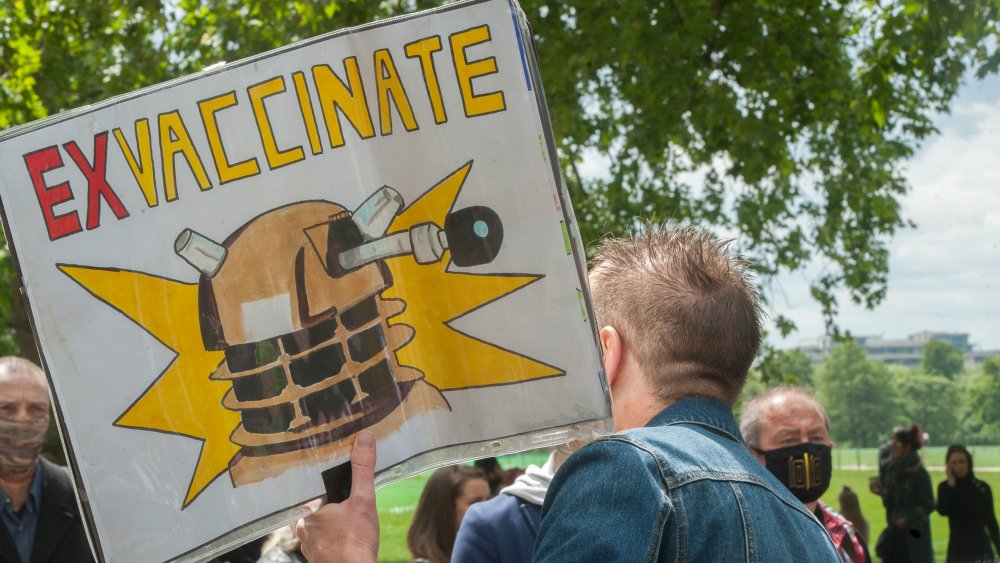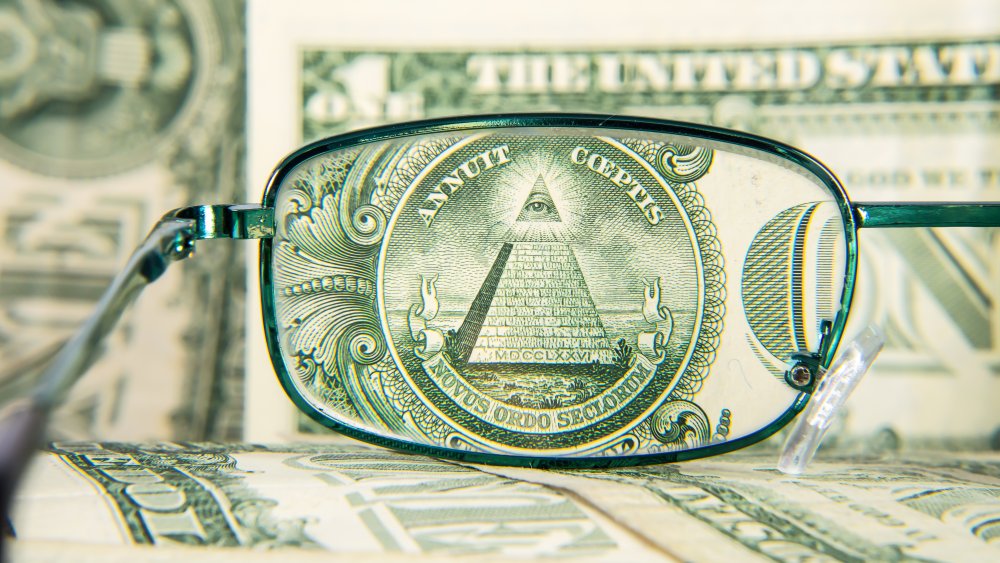The Real Reason People Believe In These Strange Conspiracy Theories
Society has, sadly, entered the golden age of conspiracy theories. This is an era wherein a radio host screams about how tap water is engineered to "turn the frogs gay," where bizarre theories get real people killed in mass shootings, and where a U.S. president rose to power after floating one such racist conspiracy theory about birth certificates. Strange times, for sure. These days, the whispered accusations and elaborate formulas once reserved for the sketchiest corner of your local dive bar have gone mainstream, and such important tenets as truth, science, and trust are paying the price.
And while it may be tempting to just nervously laugh when your racist cousin starts blathering about how "reptilians run the world," the increasing prevalence of conspiratorial thinking, as formerly rational people fall into the cracks of this disturbing trend, is actually a huge problem that deserves a deeper look. After all, nobody is born a conspiracy theorist. So, what causes people to get enmeshed in this strangeness? What is the psychology behind it all?
Wait, so SOME conspiracy theories are real, right?
Now, to be clear, you absolutely should question authority. Real-life governments certainly have engaged in shady business that should be broadcast widely. Watergate is one obvious example. PRISM, the NSA spying program leaked by Edward Snowden, is another. Then there's COINTELPRO, or the long history of how the U.S. government toppled governments throughout Latin America, as explained by the Associated Press, usually to install U.S.-backed authoritarians in their place. These are just a few examples.
However, real-life conspiracies function differently from the fictional ones you often hear about. For one, the real thing is never quite so grand, and never just one piece of a giant spider web of conspiracies, as The Conversation explains. Real-life conspiracies events like governments torturing their own citizens, not great plots for global domination. Furthermore, real conspiracies tend to leak ... because, frankly, it's near-impossible to keep people quiet for their entire lives. For example, when people claim the moon landing was faked, they're ignoring the fact that that this achievement involved, quite literally, thousands of workers.
Considering that, as John Oliver pointed out, you can't even keep your friends from spoiling a surprise birthday party, doesn't it suddenly seem totally laughable to imagine thousands of NASA scientists keeping mum for over a half-century about a faked moon landing? As Scientific American put it, when explaining how to detect if a conspiracy theory is grounded in reality, "The more people involved, the less realistic it becomes."
Accepting conspiracy theories is about finding order in chaos
If you're a journalist looking to uncover a real cover-up, you start by asking questions and seeing what you find. Conspiracy theorists, though, start with their conclusion — i.e., "I think COVID-19 was manufactured in a lab by Bill Gates, as a form of population control" — and then go cherry-picking for evidence that supports said conclusion, ignoring other possibilities, and often linking to other conspiracy theories.
But why exactly do people start falling into the trap of conspiratorial thinking? And why is this a growing trend?
Well, face it, the last couple of years have been chaotic. The year 2020 has been even worse. Anxiety is widespread. Nothing seems to make sense. And that, right there, is the key, as Scientific American explains: conspiracy theories reach through the chaos of real life to manufacture a solid "bad guy" and create an artificial sense of logic and order. While a sense of disenfranchisement leads to anxiety, a grand conspiracy theory provides comfort by making the world seem as if it could be fixed, if only the aforementioned supervillain were stopped.
This lends a sense of control, a feeling of empowerment, and also allows the conspiracy theorist to feel as if they are smarter than the "sheep" (a.k.a., ordinary people) since they are one of the few "free thinkers" smart enough to suss out the conspiracy. Basically, as psychology professor Anthony Lantian puts it, conspiracy theories make people feel special.
The rewards of conspiracy theories are fleeting
Of the various conspiracy theorists in your social circle, you've probably noticed that they don't tend to be the happiest individuals. However, this has less to do with them being paranoid about their phones being hacked — besides, given Facebook's unending series of privacy violations, who isn't paranoid about that, these days? — and more to do with the fact that while conspiracy theories do initially create a sense of empowerment and intelligence, those psychological rewards diminish quite rapidly.
Why? Because conspiratorial feelings emerge from feelings of anxiety and alienation, as Scientific American asserts, these same feelings soon come surging back to the forefront as the conspiracy theories themselves serve to further ostracize and isolate conspiracy theorists from their friends, family, and coworkers. This, in turn, can create deeper anxiety and self-consciousness. The further an individual plunges into the black hole of irrational thinking that conspiracy theories nurture, the worse this situation becomes, and they tend to act in ways that increase their powerlessness.
For some individuals, of course, this can lead to dangerous behaviors, such as the Pittsburgh synagogue shooting. Clearly, most conspiracy theorists aren't going down such violent paths, but that doesn't mean conspiratorial thinking isn't self-destructive to the lives of them and others in a variety of ways.
Anybody can fall through the conspiracy theory cracks
When discussing conspiracy theories, it's important not to fall into an "us or them" mindset, to attribute conspiratorial thinking to any particular demographic, or to write off conspiracy theorists as stupid. The truth is, given tragic circumstances, anyone, no matter how reasonable, can accidentally slip off the edge into some form of conspiratorial thinking. And while they might not believe in fourth-dimensional reptiles, that doesn't mean this sort of thinking is any less dangerous.
For instance, a communication professor named Dannagal G. Young wrote for Vox regarding how her husband's brain cancer — a horribly random and unexplainable diagnosis — made her feel powerless, and thus caused her to descend into conspiratorial thinking. As she explains, her desperate need to find a reason for her husband's seemingly random tragedy, to locate a clear villain, slowly led her to blame chemicals at his job, a nearby factory, and other targets that didn't check out. All these theories gave her a focus and made her feel like a "warrior" instead of the powerless figure that she, and others in such circumstances, truly are.
In the end, her husband died. As an expert in her field, she was able to come to terms with how the tragic randomness of his condition had driven her into this mindset. However, her story clarifies just how intoxicating conspiratorial thinking can be and why anyone can be at risk.
Conspiracy theories are a closed loop
When someone is enmeshed in a conspiracy theory, presenting them with contradictory evidence rarely works to undo their thinking. In fact, by fighting their arguments or citing proven sources, you can even lend credence to their notion that an unseen power is at work: They'll tell you that the scientists in your study were paid off or that you're brainwashed by "the media" while linking you to a fishy YouTube video with bombastic music.
Essentially, conspiratorial thinking is a closed loop because the theory's conclusion is already set once the theory exists. Anything that aligns with that conclusion, no matter how illogical, will be brought in. Anything that contradicts it will be seen as evidence of a deeper truth being covered up. Understand, as Whitney Phillips writes for Wired, that conspiracy theories emerge from an individual's "deep memetic frames," or as she describes it, "what we believe in our bones to be true about the world."
These deep memetic frames are formed from childhood onward through experiences, studies, traumas, and social groups, and they frame all new information you receive. For conspiracy theorists, then, what you have are people who have a deeply ingrained distrust of an "other," whether that other is the government, a racial group, or what have you. Thus, in the face of confirmation bias, the contradictory facts that someone might bring up will — rather than disproving the conspiracy — become further evidence of the conspiracy.
Conspiracy theories tend to get real racist, real quick
If you don't have a beloved family member wearing a tinfoil hat, it can be tempting to laugh off most of these conspiracy theories as harmless nonsense. After all, who cares if some "weirdos" think that a cult of fourth-dimensional lizard-men rule the world? The truth is, though, conspiracy theories aren't harmless. People do get hurt by them. And because so many of these theories are rooted in a sense of disenfranchisement, you often don't have to dig too deep before you see bigotry underlying many of these concepts.
Take the aforementioned reptilian thing, for instance — i.e., David Icke's infamous argument about how the world is run by scaly aliens who masquerade as powerful humans. On a surface level, this seems hilarious. When you look deeper, though? A large number of the prominent people accused of being secret reptilians are Jewish, as Vox points out, which plays right into the same age-old anti-Semitic tropes that led to the Holocaust and other historical atrocities that have been perpetrated against Jewish people.
The racism-tinged theories don't end there, however. A more widespread example can be found in birtherism, a.k.a. the ridiculous assertion that former President Barack Obama — a guy born in Hawaii, of a mother from Kansas — was not a true American citizen. Even though public figures like Colin Powell called out this racism for what it was, as Observer points out, birtherism got a scary amount of coverage for something so preposterous.
When it comes to conspiracy theories, the man with the mic is often just a salesman
Conspiracy theories can come from many places and take many forms, but they often tend to be a "top-down" phenomenon to some degree: Regardless of where a bizarre theory originated, it goes wide after a public figure starts spreading it. These figures, though, often are not true believers themselves but simply putting garbage ideas out there for political gain and/or financial benefit.
For instance, you think all those people selling bogus USB sticks to protect you from 5G radiation, as BuzzFeed reports, believe in their products? Probably not. Then there's InfoWars host Alex Jones, who might be the world's most notorious conspiracy theorist, even though he doesn't believe any of the BS he puts out into the world. Yes, seriously. In a 2017 custody battle with his wife, Business Insider reported that Jones' lawyer attested under oath that his client's crazed InfoWars persona was Jones "playing a character. He is a performance artist."
Jones is not the only one to take advantage of conspiracy believers, though. President Donald Trump, for instance, frequently makes up conspiracy theories to smear his political enemies, as the Atlantic points out. For example, see his claim that he only lost the 2016 popular vote because of "voter fraud," even going so far as to create a commission to research the matter ... which, of course, found no evidence, because Trump had simply made up the conspiracy.
What personal traits and experiences lead to the acceptance of conspiracy theories?
Certain social, economic, and psychological factors will make some individuals more prone to conspiratorial thinking than others. In recent years, there have been many studies behind the psychology of conspiracy theorists that have found linking threads. These include, as Business Insider explains, social isolation, alienation, and low self-esteem. A person who struggles to fit in, or one who feels that intellectual institutions look down upon them, is more easily primed to look for solid justifications behind their seeming disenfranchisement or to seek a sense of belonging among other outsiders who don't fit in, such as fellow conspiracy theorists, which in turn can lead to a person digging deeper and deeper down the rabbit hole.
In an interview with Vox, Jan-Willem van Prooijen — a social and organizational psychologist at Vrije Universiteit Amsterdam — explained that once you fully invest in one conspiracy theory, it's the gateway drug to believing in others. As he puts it, "I'm not sure if it's addicting, but it's perpetuating. The more conspiracy theories you believe in, the more susceptible you'll become to others."
Why conspiracy theories are actively harmful
If you believe in some of the terrifying stuff that conspiracy theorists believe, you might feel urged to take action. Even more so if such theories were fueled by the sort of bigotry, mental health concerns, and isolation that often come into play. As a result, while many people try to dismiss conspiracy theorists as a joke, the truth is that their theories — and the spread of them — can be actively harmful to real lives.
Conspiracy theories, when combined with white supremacy, can lead directly to mass shootings: This was notably demonstrated by the 2018 synagogue shooting in Pittsburgh, as Vox explains, wherein a man fueled by anti-Semitic conspiracies murdered 11 people at a synagogue. That same year, conspiracy theories led another man to send pipe bombs to prominent politicians. In 2016, conspiracy theories led to a man busting into a D.C. pizzeria with an assault rifle. In 2020, as reported by ABC News, conspiracy theories linking 5G to COVID-19 led people to burn down cell phone towers.
Meanwhile, countless survivors of historical atrocities are now being further traumatized by the abuse heaped on them by conspiracy theorists, such as Holocaust survivors being accused by denialists of perpetuating a hoax. Another example? Because of the conspiracies that Alex Jones spread about the Sandy Hook shootings, PBS reported that at least one father of a murdered child — his six-year-old son was shot during the tragedy — now lives in hiding because of harassment and death threats from Jones' followers.
How widespread is conspiracy theory thinking, really?
Feel like you're hearing people tell you weird conspiracy theories a lot more than you used to, particularly in light of the pandemic? You're not imagining this, unfortunately.
According to a June 2020 research study conducted by Pew, at least one in four U.S. adults believe that it is possible that powerful figures have intentionally planned the COVID-19 pandemic. A whopping 20 percent of those surveyed only said this was "probably" true, but at least 5 percent said it absolutely was. Chances are, you've heard at least one person in your life speculate the same.
Age and partisanship certainly play roles in these numbers, but regardless, they demonstrate not only how much conspiratorial thinking has grown, but also, the psychology behind it: Throughout the year, just about everyone has been anxious, and with no clear enemy to point to — because a virus, awful as it might be, can't be blamed for being a virus — and so people are driven into figuring out which "villain" might've concocted the whole thing.
Conspiracy theories have actually gotten worse
In 2019, Vox interviewed Harvard politics professor Nancy Rosenblum about her new book, A Lot of People Are Saying, and she made an interesting — albeit, terrifying — point: namely, that today's conspiracy theories are more muddled, less logical, and more politically targeted than those of the past.
As you can probably guess, her title is based on a trope that President Trump commonly employs when he's about to say a conspiracy theory: "A lot of people are saying that ____." In such instances, Trump is clearly doing this to remove himself from the conspiracy theory he's about to promote (i.e., "I didn't say it, but a lot of people did") and also because his aim isn't to ask questions so much as to delegitimize whatever institution he's planting a theory about. For example, he claimed that the "mainstream media" lied about his inauguration crowd size even though evidence proves otherwise.
However, Rosenblum's deeper point, in this regard, is that while conspiracy theories of the past were formed out of attempts to explain real events and at least gave a surface level of evidence, today's conspiracy theories are just blunt assertions with no evidence whatsoever. As she explains it, "Instead of trying to explain something that happened in the world, it's about creating a narrative that itself becomes the reason for the conspiracism." These new theories, as a result, are arguably even more dangerous than those of the past.
What can be done to fight back against conspiracy theories (and help your family members)
Don't mock conspiracy theorists. It's tempting, sure, particularly once the lizardmen or Illuminati get involved. However, while laughing at conspiracy theories as you scroll through your phone at night is one thing, as Wired explains, it's quite different when you publicly make fun of them or share the theories in jest because you're still acting to spread and perpetuate the concepts. Plus, driving conspiracy theorists themselves deeper into their sense of alienation ... thus promoting the growth of more conspiracy theories.
If your loved one has fallen into conspiratorial thinking, recognize that this strange new behavior probably comes from a place of fear, loneliness, and a desire to feel valuable. While reasoning with conspiracy theorists can feel hopeless, it's still worth trying. To do this, however, don't just try to bust myths. Be compassionate. Listen. Relate, and speak in ways that they relate to. For example, as the Conversation explains, "conservative climate-change deniers are much more likely to shift their views if they are also presented with the pro-environment business opportunities."
In other words, while pro-environment business opportunities probably aren't why you care about climate change, this conversational tactic can nudge someone in the right direction, shift them back toward scientific reality, and thereby fight back against the rising tide of conspiratorial thinking.
None of this is easy, but for the sake of truth and reason, every conversation counts.

